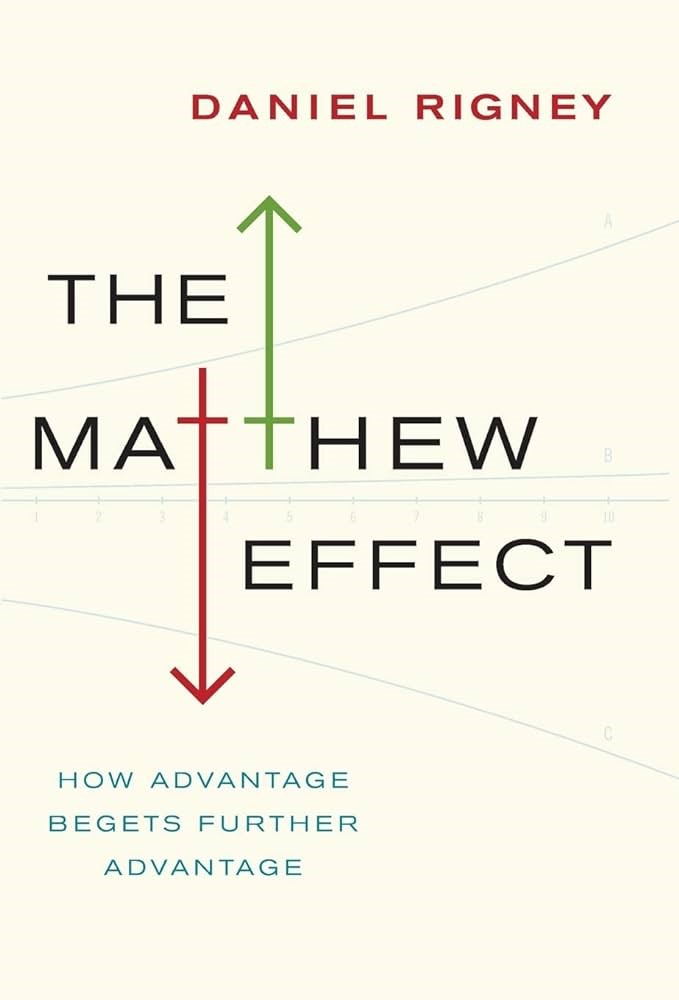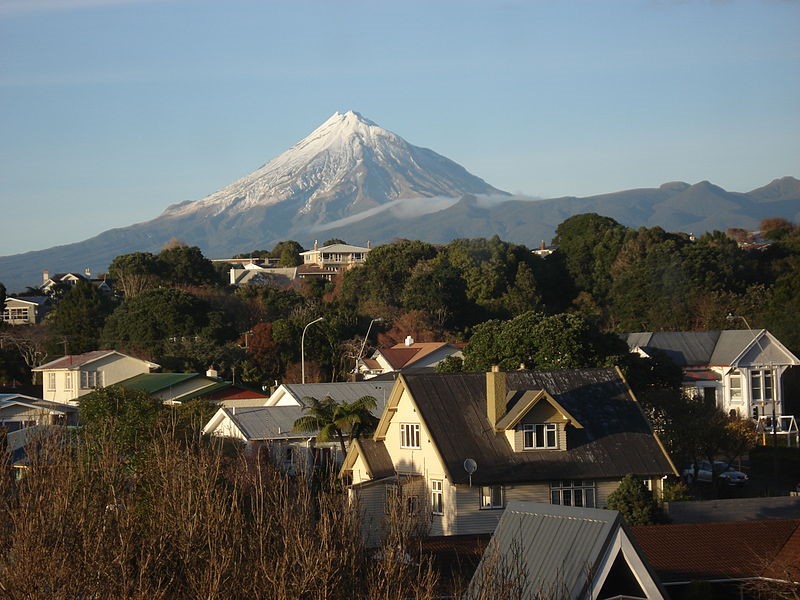‘Money makes money. If you want to get ahead in New Zealand today, you need to start with some money.’
Someone said this to me a few weeks ago. I know them well.
At the time, I didn’t have a rebuttal. Having thought about it, I realised this is at the heart of socialist concern.
The sentiment goes like this: ‘Some people have more than me. I’m struggling. That’s not fair. And now they’re in a position to prosper even more, while I’m just treading water or going backwards.’
Thoughts lead to actions. This is possibly the main reason why people vote for parties on the Left. They want income and wealth to be redistributed more evenly.
The Matthew Effect

Does initial advantage always lead to further advantage?
Sometimes disadvantage and humble beginnings begets success.
Source: Columbia University Press
‘To those who use well what they are given, even more will be given, and they will have an abundance. But from those who do nothing, even what little they have will be taken away.’
—Matthew 25:29
The above is The New Living Translation (NLT). It translates entire thoughts from the Bible (rather than just words) into English.
The Matthew Effect is often misunderstood to mean: ‘The rich get richer while the poor get poorer.’
This misses the thought process of the original text. Here we see: ‘To those who use well what they are given…’
And this is the point my more socialist friends might miss.
Studies of wealthy people show that most have made their own luck. Only a small minority came from money.
In the US, Dave Ramsey’s 2018 National Study of Millionaires found:
- Only 21% of millionaires received any inheritance.
- Just 16% inherited more than US$100,000.
- Only 3% received an inheritance at or above $1 million.
- ‘The majority of the millionaires in the study said they earned their money through long-term investing.’
Further, 93% of them said they built their wealth by working hard, not from big salaries. Just over 30% averaged $100,000 a year across their career. Fully 33% never made six figures in any year.
The top millionaire job choices were managers of businesses, engineers, accountants, lawyers, and teachers.
Previous studies by the late Dr Thomas Stanley found that most American millionaires built fairly ordinary small businesses. While self-employed people make up less than 20% of the workforce, Stanley found they accounted for 67% of millionaires.
Clearly, having control over your own income and business decisions could help build wealth more efficiently than a job.
The New Zealand situation

Taranaki. A more affordable region? Source: Wikimedia Commons
I left my family home at the age of 18. I moved from Taranaki to Auckland in 1993.
From memory, I started with about $15,000 in savings and shares. I’d earned this from running small enterprises as a teenager. These activities ranged from selling pizzas (door to door), as well computer peripherals by mail.
Some new business opportunities emerged while I was studying finance at Auckland University. One was providing tutoring services to the children of new migrants from Asia. They had started settling in larger numbers.
So, I paid my own way through Uni and life in the Big Smoke. No student loans, allowances, money from family, or the government.
By the time I graduated, I had a house deposit. A few years later (with the help of flatmates), I paid off the mortgage. Then I started building a wider share portfolio.
Mainly, I just made the best from what I’d been given. A stable, loving family. Then an opportunity-rich environment.
Do the same opportunities exist in New Zealand today?
The 1990s and early 2000s was a great time to work and invest. Regulation was lighter. New Zealand was more affordable. Especially for housing.
Yet there’s probably more opportunity today, particularly with technology. There’s far better access to global investing, for one thing. Choice abounds like never before.
Today, a key hurdle is often paying for expensive housing while trying to diversify investing.
For many, paying off the house becomes the only investment. And in my book, that’s not going to take you very far.
Why are houses so expensive now?
A developer in Auckland told me he used to be able to build a home in 12 weeks.
Now it’s taking him 11 months.
He blames the hurdle of regulations. The attitudes of risk-wary councils.
He’s so frustrated that he’s at the point of giving up.
The creep of bureaucracy has hit industries all over New Zealand. The more obstacles you put in front of businesses, the more expensive things become. The more opportunities you starve off.
Every morning, hardworking Kiwi business owners get up to make things better, faster, and cheaper. So they can compete in the market. Why hamstring them?
The market knows far better than any government official what is really needed.
Today, there may be more opportunity for people who have already built up housing capital.
But smart people are still finding ways to get around that. Buying homes with friends and family. Choosing more lucrative careers. Going offshore for a while. Starting out in more affordable towns. And, when they get on the ladder, taking in flatmates or selling a room on Airbnb.
The key is being enterprising with what you have and from where you are. Then building capital for long-term investing. Finding and opening the door to opportunity yourself.
That was probably just as hard in the 1990s.
Prosperous people earn their money through long-term investing
Ramsey’s study shows high income is not the deciding factor in building wealth.
Instead, investing for the long-term makes all the difference.
That means building capital. Optimising the investment of it over the longer term. And letting it compound.
Yet a lot of people put off entering the market. They leave their money in no-growth or low-growth situations. They don’t put their money to work.
Instead, they say:
- ‘I will leave the decision till later.’
- ‘It’s not a good time. There might be another crash coming.’
- ‘I can’t handle seeing my money go up and down.’
- ‘I’m only comfortable investing in residential property.’
- ‘The bank seems safe. Why should I do anything else?’
“Can’t wait for a pull back” pic.twitter.com/kjvilCOwp8
— Brian Feroldi (@BrianFeroldi) January 23, 2024
More excuses to delay investing. Source: Brian Feroldi / X
When you’re investing for the long-term, the time you enter the market might not actually matter that much.
One study of the S&P 500 found that over a 10-year holding period, the probability of making money in stocks was about 90%*.
Investing for abundance can be found in assembling a robust and diversified portfolio of quality stocks for the long-term. These are companies that own decent assets, sell in-demand goods and services, and are able to grow across the market cycles.
It’s about using well what is given out every day: unique opportunity.
Then with the magic of compounding — and over the long-term — you ought to find even more will be given to you.
Regards,
Simon Angelo
Editor, Wealth Morning
(*Past performance is not an indicator of future performance. This article is general in nature and should not be construed as any financial or investment advice. Wealth Morning offers Managed Accounts for Wholesale and Eligible Investors.)





Simon is the Chief Executive Officer and Publisher at Wealth Morning. He has been investing in the markets since he was 17. He recently spent a couple of years working in the hedge-fund industry in Europe. Before this, he owned an award-winning professional-services business and online-learning company in Auckland for 20 years. He has completed the Certificate in Discretionary Investment Management from the Personal Finance Society (UK), has written a bestselling book, and manages global share portfolios.